Recently, the Radiographers Registration Board of Nigeria cried out over acute shortage of radiographers and sonographers, sparking concerns about the implications for Nigeria’s healthcare system. In this special report, Korede Abdullah delves into the far-reaching consequences of this shortage, exploring how it affects the quality of care and patient outcomes in Nigeria’s health sector.
Healthcare Landscape in Crisis
Nigeria’s healthcare landscape is shrouded in a dire crisis, as the scarcity of radiographers and sonographers casts a long shadow over the nation’s medical infrastructure.
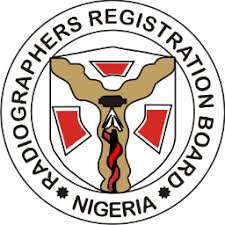
With these core professionals playing a vital role in medical imaging and diagnosis, their scarcity puts immense pressure on the remaining workforce, leading to stress, fatigue, and burnout.
Professor Mark Okeji, Registrar and Chief Executive Officer of the Radiographers Registration Board of Nigeria, sounded the alarm on the dire shortage of these very important health professionals in the country, revealing a startling figure that highlights the severity of the crisis.
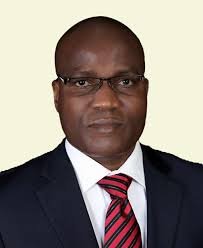
At the 12th Annual Conference of the Association of Medical Ultrasound Practitioners of Nigeria, held in Lagos on October 28, Professor Okeji addressed the nation’s shortage of radiographers and sonographers, sharing alarming statistics on the sidelines of the event, which focused on “Standard Obstetrics and Gynaecological Ultrasound Protocol.”
With a paltry 4,800 radiographers catering for a staggering 200 million-strong population, the country’s diagnostic and therapeutic capabilities are severely strained.
He said the figure was grossly inadequate and would not meet the healthcare needs of Nigeria’s population of over 200 million.
Shortfall and Brain Drain
This alarming shortfall is further exacerbated by the relentless brain drain, as healthcare professionals seek greener pastures abroad, leaving behind a void that threatens to engulf the already fragile healthcare system.
Vital Roles of Radiographers and Sonographers in Healthcare
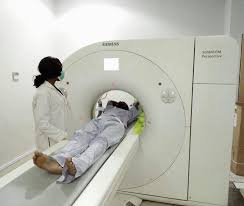
Radiographers and sonographers are the unsung heroes of the medical world, playing a crucial role in diagnosis and treatment.
These healthcare professionals are responsible for producing and interpreting medical images, utilizing specialized equipment to aid in patient care.
Radiographers operate X-ray, CT, MRI, and other imaging equipment, positioning patients for procedures, adjusting settings for optimal image quality, and maintaining patient records.
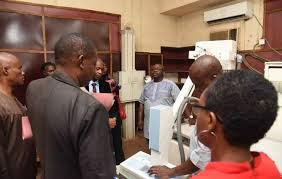
Sonographers perform ultrasound examinations, capturing and analysing images to identify abnormal findings.
From ensuring patient safety and comfort to collaborating with radiologists and healthcare professionals, radiographers and sonographers work together to provide top-notch care.
They share responsibilities, including maintaining equipment, adhering to safety protocols, and staying updated with advancements in imaging technology.
As essential members of the healthcare team, radiographers and sonographers contribute significantly to patient diagnosis, treatment, and management plans.
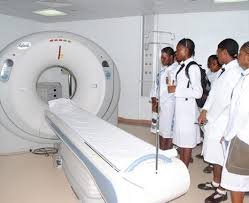
Their expertise and dedication are vital to delivering quality healthcare services, making them indispensable assets in the medical community.
The scarcity of skilled radiographers and sonographers has transformed Nigeria’s hospitals into overwhelmed bastions, struggling to provide adequate care to patients.
The Shortage Hits Alarming Proportions
A recent visit to the Federal Medical Centre in Ebute-Metta, Lagos State, by our correspondent laid bare the dire situation facing Nigeria’s healthcare system.
A radiologist, who spoke on condition of anonymity, revealed that the facility is grappling with a severe shortage of staff. “The situation is that terribly bad,” the radiologist lamented, emphasizing that this is not an isolated issue, but a nationwide problem.
The radiologist painted a grim picture, highlighting that the ratio of sonographers to the Nigerian population stands at an alarming 1:250,000.
“The situation is terrible,” he stressed, underscoring the urgent need for intervention. This shortage not only compromises the quality of care but also puts an unbearable burden on the existing workforce.
As Nigeria struggles to address its healthcare challenges, the radiographer shortage has become a significant concern.
Experts warn that this crisis will have far-reaching consequences if left unaddressed, including delayed diagnoses, inadequate treatment, and increased mortality rates.
Shortage Worsened by Limited Training Opportunities
Africa Health Report learned that Nigeria’s severe shortage of radiographers and sonographers has been compounded by a lack of specialized training programs, with only 23 universities out of 274 offering radiography departments.
This scarcity of educational opportunities hampers the development of skilled professionals, exacerbating the crisis.
Previously, only eight universities offered radiography programs, but the Radiographers Registration Board of Nigeria, led by Registrar Prof. Okeji, has made strides in addressing this shortage.
Since taking office six years ago, Okeji has overseen the establishment of training programs in 15 additional universities, bringing the total to 23.
Despite this progress, the shortage persists, highlighting the need for continued investment in radiography and sonography education. With 149 private, 63 state, and 62 federal universities in Nigeria, there is significant room for expansion.
The Radiographers Registration Board of Nigeria’s efforts demonstrate a commitment to addressing the shortage.
But according to Dr Charles Adeyemo, a UNICEF medical consultant, who spoke with this newspaper, said greater collaboration between educational institutions, government agencies, and healthcare organizations is necessary to develop a robust workforce of skilled radiographers and sonographers.
Daunting Work-Related Challenges
Radiographers and sonographers in Nigeria are beset by numerous work-related health issues, including debilitating musculoskeletal disorders.
These occupational hazards not only affect their well-being but also discourage aspiring professionals from pursuing careers in these critical healthcare fields.
Unlike their counterparts in the US, Canada, and other advanced countries, Nigerian radiographers and sonographers often lack access to adequate support systems, exacerbating the physical demands of their jobs.
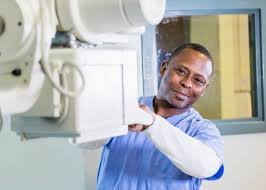
The cumulative effect of these challenges is a severe shortage of skilled radiographers and sonographers in the country.
The physically demanding nature of their work, combined with inadequate resources and poor working conditions, takes a toll on their health and productivity.
Poor Remuneration Packages
A stark disparity in salaries is driving radiographers and sonographers out of Nigeria, seeking greener pastures abroad.
Investigations by Africa Health Report revealed that radiographers in the US earn an average annual salary of $71,178 ($34.22/hour), with entry-level positions starting at $53,493 and experienced professionals earning up to $124,827.
In contrast, Nigerian radiographers earn significantly lower, with an estimated average monthly salary of NGN 177,000 (approximately $390 USD). In Abuja, the median salary stands at NGN 160,000 per month.
This glaring pay gap has led to a brain drain, as skilled radiographers and sonographers seek better opportunities abroad.
The market value for these professionals in Nigeria remains woefully low, resulting in poor remuneration packages.
Exodus of Radiographers and Sonographers for Greener Pastures
Nigeria’s healthcare system is facing a devastating brain drain as trained radiographers and sonographers are also joining their professional colleagues in the health sector to flee the country in droves, seeking better opportunities abroad.
This mass exodus is the final blow to an already beleaguered profession, depriving Nigeria of much-needed expertise and worsening the shortage.
The primary drivers of this brain drain are poor remuneration packages, inadequate working conditions, and limited career advancement opportunities.
Citing lack of job satisfaction, inadequate infrastructure, and uncompetitive salaries, many radiographers and sonographers are opting to leave Nigeria for countries like the US, Canada, and the UK.
The allure of better pay, state-of-the-art equipment, and improved quality of life has proven irresistible.
With an estimated 50% of Nigeria’s trained radiographers and sonographers having left the country, the remaining workforce is overwhelmed, further compromising healthcare delivery.
Nigeria’s Radiographer Shortage Takes Toll on Healthcare Quality
Dr Adeyemo said Nigeria’s severe shortage of radiographers and sonographers has far-reaching consequences, compromising the quality of healthcare services nationwide.
“The scarcity of these critical professionals’ hampers diagnosis and treatment, leaving patients vulnerable to misdiagnosis or delayed care.
“Inadequate radiography and sonography services hinder medical teams’ ability to accurately detect and manage diseases, exacerbating health outcomes.”, he said.
Overwhelmed Existing Workforce Faces Burnout
Nigeria’s severe shortage of radiographers and sonographers has left the remaining professionals on the brink of burnout, threatening to collapse the already strained healthcare system.
With an unbearable workload and overwhelming demand, existing radiographers and sonographers are struggling to keep up, compromising their ability to provide quality care.
Africa Health Report (AHR) gathered that Many Nigerian health institutions are resorting to assigning radiography and sonography tasks to nurses and non-professionals, who lack the specialized training and expertise to handle these critical roles.
This stopgap measure, born out of desperation amid a severe shortage of radiographers and sonographers, raises concerns about patient safety and the overall quality of care in Nigeria’s healthcare system.
As fatigue and stress take their toll, a vicious cycle ensues, further diminishing the healthcare system’s capacity to deliver essential services and highlighting the urgent need for increased recruitment and support to alleviate the pressure on Nigeria’s dwindling radiography workforce.
Experts Warn of Long-Term Consequences
Healthcare experts warn that Nigeria’s radiographer shortage will have long-term consequences if left unaddressed.
Delayed diagnoses, inadequate treatment, and increased mortality rates are among the dire predictions.
To mitigate this crisis, Nigeria must prioritize training and recruitment initiatives, improve working conditions, and invest in cutting-edge equipment. By addressing the shortage, Nigeria can ensure its healthcare system delivers quality care to those who need it most.
Addressing the Shortage
According to the duo of Dr. Adeyemo and Dr. Ademola Ajibade, experts who spoke to this correspondent, proposing comprehensive solutions to the dire shortage of radiographers and sonographers is expedient.
Dr. Adeyemo advocated increased training, emphasizing the need for government and private sector investment in radiography and sonography education.
He said that it would enable more students to pursue these critical professions, ultimately increasing the workforce.
“Additionally, improved work conditions in terms of conducive environment, are essential, this includes addressing work-related challenges, such as musculo-skeletal symptoms common among radiographers and sonographers and providing better equipment and facilities.”, Dr Adeyemo explained.
Retention Strategies
Dr. Ajibade on his own, proposed retention strategies to keep trained professionals in the country.
“Incentives, such as competitive salaries, career advancement opportunities, and continued education, would encourage radiographers and sonographers to remain in Nigeria, rather than seeking opportunities abroad.
“By implementing these measures, Nigeria can strengthen its healthcare system, reduce waiting times, and provide quality care to its citizens.”, he added.
The experts’ proposals offer a beacon of hope for a healthcare system struggling to cope with the shortage of these vital professionals.
Tackling the Root Causes
Nigeria’s dire shortage of radiographers and sonographers demands immediate attention to prevent further deterioration of the country’s healthcare system.
To effectively address this crisis, experts maintain that it’s crucial to tackle the root causes and implement practical solutions, which will not only enhance healthcare services but also save countless lives.
The brain drain of healthcare professionals in Nigeria is primarily driven by “push factors” such as low remuneration, poor working conditions, and limited career opportunities, which compel skilled workers to seek better prospects abroad.
Nigeria’s healthcare sector is facing a critical brain drain, but stakeholders are calling for urgent action to reverse this trend.
To stem the exodus of talented medical professionals like radiographers and sonographers, it’s essential to address the underlying issues driving them away, including poor working conditions, inadequate resources, and limited career opportunities.
By providing a conducive work environment and retaining vital healthcare professionals, Nigeria can ensure its citizens receive quality care.
This requires a multifaceted approach, including increased funding for training, improved work conditions, and retention strategies such as competitive salaries and career advancement opportunities.
The World Health Organization (WHO) emphasizes the importance of prioritizing healthcare worker well-being and safety to maintain a robust healthcare system.
Experts say by taking proactive steps, Nigeria can reduce the brain drain and foster a healthcare environment that attracts and retains its top talents, ultimately benefiting the nation’s health and well-being.



